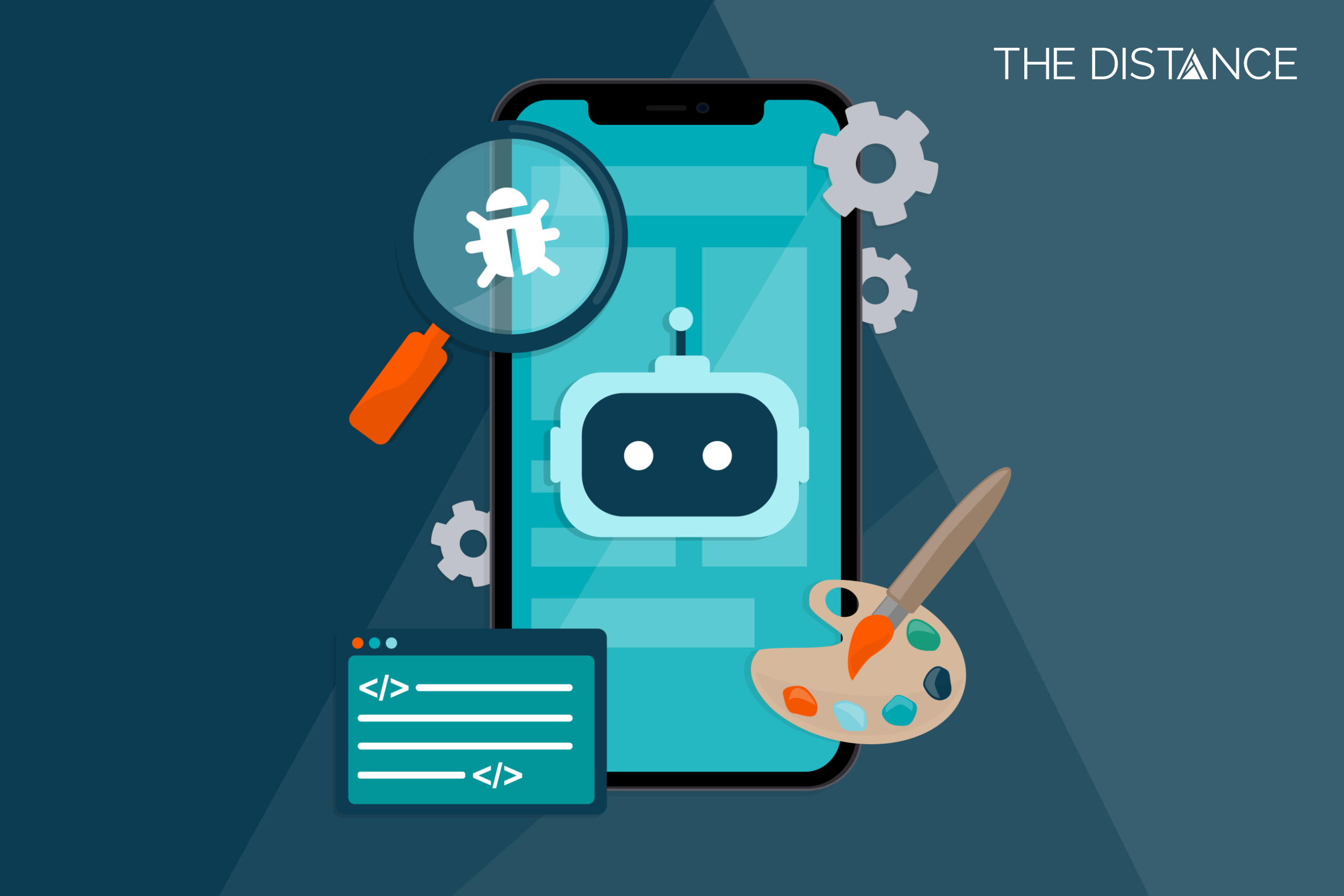A.I. is pretty much everywhere these days, from word processors to washing machines. Rather than merely learning and refining processes like machine learning tech does, these artificial intelligences have a general intellectual flexibility which can be applied to diverse tasks, and which mimics elements of human cognition.
Unsurprisingly, all sorts of app industry professionals have been experimenting with A.I. tools that promise to bring efficiencies and add value to app creation processes.
We spoke to members of our app agency team, including a developer, a tester, a project manager and a UI designer, to learn what each specialist thinks about A.I., and how some of them are already using A.I. tools in their day-to-day work.
Caleb, Front-end developer
How are you using A.I. tools in your work?
In the past six months, our development team has been using A.I. tools like GitHub Copilot and ChatGPT day-to-day.
The A.I. used in these tools has been trained on a large proportion (570gb) of the internet to create their knowledge base. If you have a specific question you’re looking for, it’s easier to get a result with consideration for the particular context than it would be using a search engine. An A.I. tool is therefore better than using Google these days, because search engines typically give you a huge number of web pages to look through manually.
Unlike Google, ChatGPT prioritises your specific request, so it gives you a more accurate answer in a simple and curated format. It also provides an explanation for that answer, and sometimes it even gives you examples of code that you can review before you write your own code.
A.I. has already been a big help with development, and I see myself using it more and more. I ask ChatGPT questions about once per day. I was frustrated the other day because the free version wasn’t working – and at that moment it dawned on me that I’m beginning to use this tool in my daily coding.
If a company wants to increase their efficiency and speed-of-execution, they need to depend more on A.I. tools for day-to-day tasks.
What are the implications of A.I. for your career?
A big change is coming for developers who use A.I. tools.
Many people complain that A.I. is taking jobs, and it’s true that there will be higher barriers to entry for people who are starting out. We may not need as many developers as before for simpler exercises, because A.I. has sped up implementation.
As an experienced developer, I’m not too worried. The way we work will change: we will often act as ‘prompt engineers’ – someone who asks A.I. questions in a very precise, concise way, so that it gives you the most accurate answers. The key will be understanding the language models behind these tools.
Instead of developers writing boilerplate code, A.I. will write the basic code for us. Our job will be to understand the code, investigate whether it is optimal or not, and try to make it better. We’ll focus our time on the more complex user or technical problems, that A.I. would not be able to solve (yet)!
Romi, Test Analyst
How will you use A.I. to help with testing app builds and features?
We’ve already implemented Sofy.ai, which is a no-code, automated testing tool that uses A.I..
Using this tool means we can create test cases or test suites without having to write any scripts. We just run the application, and Sofy.ai interprets our requirements and creates a no-code automated test for us.
Previously we used non-A.I. automation tools, which meant we had to use at least one programming language to create test cases – e.g. Javascript or Typescript. Now, thanks to A.I., anyone can create an automated test case, regardless of their coding knowledge. This is beneficial, because manual tasks like writing test cases, regression testing, application testing, and recreating bugs were time-consuming.
With the implementation of A.I. automated tools, testing will be more efficient, and more effective.
How will A.I. affect your career as a tester?
In the I.T. industry, you always have to be up-to-date with the latest tools.
In the future there will still be manual testing as well as automated testing, but testers won’t necessarily need to know how to program. Having experience of implementing Sofy.ai and working on that platform will be an equally good skill to have on your C.V..
Kate, Project manager
How could A.I. help with project management?
The project manager role is very reactive. You don’t know what’s going to happen each day, and you have to respond to a range of situations. Because the role is so unpredictable, I think it would be very difficult for an A.I tool to respond as a project manager would.
At the moment, we have a manual process of managing the team’s work, which involves pulling tickets in from a spreadsheet and moving them around as things happen throughout the day – e.g. a task is completed or someone encounters a problem that holds things up. This will always need to be done manually, whether there’s A.I. involved or not.
There could be a role for an A.I. tool to help with implementing automations in specific situations, so you could tell it, for example, to “push all these deadlines along by one day”. That would be really helpful, as we have to do that manually at the moment.
A.I could also be beneficial for upfront scheduling of resources, knowing individuals skillset, working patterns, deadlines etc., as it could appraise and factor in many other factors faster than a human. However, this would probably still need human moderation to ensure the A.I. tool hasn’t made any critical mistakes.
A thought from our Director, Anthony:
”In the future, A.I. could be used to potentially predict and identify risk in projects, based upon its knowledge of similar previous work, individual skillsets, etc. – especially if a shared insight from a crowdsourced dataset was used.”
Jodie, UI designer 
How is A.I. impacting UI design for apps?
A.I. for image generation and copywriting has progressed a great deal lately. A.I. tools can speed up a lot of inefficiencies in these types of work, especially when the tool makes it possible to use an A.I.-generated asset quickly.
However, there are ownership issues around images that have been made by a machine, rather than by a person who owns the copyright. This is especially pertinent if the A.I. has used existing images made by other artists or designers in its processing.
A.I.-generated imagery is a good way to get inspiration and generate types of content that you don’t necessarily need to spend a lot of time on, such as placeholder images. Or if you’re doing a concept for a proposal, then I think it’s okay to use A.I.-generated content to speed up workflow. The problem comes if you ultimately want to claim that the A.I.-generated content is your design or your work. That’s tricky, because you’ve used a tool to do it, rather than actually crafting it.
The A.I. services we use are going to become paid services, and that could complicate matters. A.I. is likely to be a premium or platform-specific tool, and not every designer will have access to it. This could make things difficult for the people who don’t use an A.I. tool, as clients and audiences may have reduced trust in the provenance of their work.
How do you feel about A.I.?
As long as it’s made clear when something is A.I.-generated, then it’s just a new type of drawing medium. People have always worried about new technology when it comes out – people were really worried when they first started printing newspapers, but actually, innovation is a good thing.
A.I. is a mixed bag. I’m not really excited about it, and I wouldn’t want to lose my job because there’s an A.I. that can do it. I think it would be better for creative people if A.I. was used mainly for the more manual tasks that aren’t fun, or which are painstaking and time-consuming – stuff like photo editing.
I still think a human touch makes the difference, with A.I. playing a supporting role in a designer’s day-to-day. The problem is that when something like A.I. gets made public, you can’t really go back… it’s happening so fast that we can keep up with it.
In app design, we draw on our experience as professionals and as people, in order to design for what users need, accessibility and usability. I don’t know if A.I. can replicate that (yet). I’ve seen A.I.-generated app concepts, and they made me sad, because they looked very samey. It takes some of the creativity out of UI design, when the designs are made using a tool that’s almost on autopilot, designing what it thinks you want, rather than designing something customised or special for that particular user.
Anthony, Director
I started playing with ChatGPT 3 quite early on and have found all sorts of uses for it. I still feel I could be utilising it more as it presents so much opportunity for humans to simplify and streamline their day-to-day activities. For example, I’ve used it to:
- Help with our marketing activity, e.g. improve blog titles
- Market research, e.g. answer particular questions around a new client vertical
- Draft job descriptions for recruitment
- Write user personas for marketing/sales strategy
- Generate naming suggestions for new products and processes, based upon key ideas
- Help with competitor analysis e.g. streamlining desktop research
I certainly see myself using AI rather than Googling in the near future. I think the big change to behaviour will come when Google integrates its own AI solution into its search bar, like Microsoft has done with Bing.
ChatGPT 
We asked ChatGPT, “How would an app development agency use ChatGPT?” Here’s the response we received:
An app development agency could use ChatGPT in several ways, depending on their specific needs and goals. Here are a few examples:
Idea Generation: ChatGPT can be used to generate new ideas for app development projects. An agency could provide some initial guidance on the type of app they want to develop, and ChatGPT could provide suggestions for features, functionalities, and design elements based on its vast knowledge base.
User Research: ChatGPT can be used to conduct user research by analyzing and summarizing large amounts of data from various sources such as social media, app reviews, and customer feedback. This can help the agency to gain insights into user behavior, preferences, and pain points, which can be used to inform the design and development of new apps.
Content Creation: ChatGPT can be used to create content for app marketing and promotion purposes. For example, the agency could input some basic information about the app, such as its features and benefits, and ChatGPT could generate a promotional copy, taglines, and slogans to be used in advertising campaigns.
Customer Support: ChatGPT can be used to provide customer support through chatbots or virtual assistants. The agency could train ChatGPT to answer common questions and provide solutions to common problems faced by users, which can save time and resources.
Quality Assurance: ChatGPT can be used to automate the testing process and ensure the quality of the app. By simulating different scenarios and interactions, ChatGPT can identify bugs, glitches, and other issues that could impact the user experience.
Overall, ChatGPT can be a valuable tool for app development agencies looking to streamline their processes, improve their services, and stay ahead of the competition.
The Distance’s approach to A.I.
We’re technophiles here at The Distance, and we’re always keen to explore the possibilities of innovations such as A.I.. If a tool has the potential to help us serve our clients better and more efficiently, we’ll check it out. You might be thinking of doing the same – in which case, we suggest you start by perusing Product Hunt’s Curated List of A.I. Tools.
As we’ve seen, different team members and departments here are currently using A.I.-equipped tools to varying extents, depending on their roles and preferences. While our use of A.I. tools might get broader as the A.I. industry matures, our approach will always be based on an effective mix of powerful tech and passionate people.
